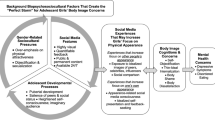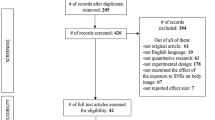Abstract
There are significant economic and psychological costs associated with the negative weight-based social stigma that exists in American society. This pervasive anti-fat bias has been strongly internalized among the overweight/obese. While the etiology of weight stigma is complex, research suggests that it is often greater among individuals who embrace certain etiological views of obesity or ideological views of the world. This investigation examined 1) the level of internalized weight stigma among overweight/obese treatment seeking adults, and 2) the association between internalized weight stigma and perceived weight controllability and ideological beliefs about the world (‘just world beliefs’, Protestant work ethic). Forty-six overweight or obese adults (BMI ≽27 kg/m2) participating in an 18- week behavioral weight loss program completed implicit (Implicit Associations Test) and explicit (Obese Person’s Trait Survey) measures of weight stigma. Participants also completed two measures of ideological beliefs about the world (“Just World Beliefs”, Protestant Ethic Scale) and one measure of beliefs about weight controllability (Beliefs about Obese Persons). Significant implicit and explicit weight bias was observed. Greater weight stigma was consistently associated with greater endorsement of just world beliefs, Protestant ethic beliefs and beliefs about weight controllability. Results suggest that the overweight/obese treatment seeking adults have internalized the negative weight-based social stigma that exists in American society. Internalized weight stigma may be greater among those holding specific etiological and ideological beliefs about weight and the world.
Similar content being viewed by others
References
Puhl R.M., Brownell K.D.: Psychosocial origins of obesity stigma: toward changing a powerful and pervasive bias. Obes. Rev., 4, 213–227, 2003.
Puhl R.M., Latner J.D.: Sitgma, obesity, and the health of the nation’s children. Psychol. Bull., 133, 557–580, 2007.
Allison D.B., Basile V.C., Yuker H.E.: The measurement of attitudes toward and beliefs about obese persons. Int. J. Eat. Disord., 10, 599–607, 1991.
Crandall C.S.: Prejudice against fat people: ideology and self-interest. J. Pers. Soc. Psychol., 66, 882–894, 1994.
Crandall C.S., Schiffhauer K.L.: Anti-fat prejudice: Beliefs, values, and American culture. Obes. Res., 6, 458–460, 1998.
Rudman L.A., Feinburg J., Fairchild K.: Minority members’ implicit attitudes: automatic ingroup bias as a function of group status. Soc. Cogn., 20, 294–320, 2002.
Wang S.S., Brownell K.D., Wadden T.A.: The influence of the stigma of obesity on overweight individuals. Int. J. Obes., 28, 1333–1337, 2004.
Rothblum E.D., Brand P.A., Miller C.T., Oetjen H.A.: The relationship between obesity, employment discrimination, and employment-related vicitimization. J. Vocat. Behav., 37, 251–266, 1990.
Friedman K.E., Reichmann S.K., Costanza P.R., Zelli A., Ashmore J.A., Musante G.J.: Weight stigmatization and ideological beliefs: relation to psychological functioning in obese adults. Obesity, 13, 907–916, 2005.
Ashmore J.A., Friedman K.E., Reichmann S.K., Musante G.J.: Weight-based stigmatization, psychological distress, and binge eating behavior among obese treatment-seeking adults. Eat. Behav., 9, 203–209, 2008.
Pagan J.A., Davila A.: Obesity, occupational attainment, and earnings. Soc. Sci. Q., 78, 756–770, 1997.
Register C.A., Williams D.R.: Wage effects of obesity among young workers. Soc. Sci. Q., 71, 130–141, 1990.
Puhl R.M., Moss-Racusin C.A., Schwartz M.B.: Internalization of weight bias: Implications for binge eating and emotional well-being. Obesity, 15, 19–23, 2007.
Vartanian L.B., Shaprow J.G.: Effects of weight stigma on exercise motivation and behavior. J. Health Psychol., 13, 131–138, 2008.
Greenleaf C., Starks M., Gomez L., Chambliss H., Martin S.: Weight-related words associated with figure silhouettes. Body Image, 1, 373–384, 2004.
Teachman B.A., Brownell K.D.: Implicit anti-fat bias among health professionals: Is anyone immune? Int. J. Obes., 25, 1525–1531, 2001.
Puhl R.M., Schwartz M., Brownell K.D.: Impact of perceived consensus on stereotypes about obese people: A new approach for reducing bias. Health Psychol., 24, 517–525, 2005.
Greenwald A.G., McGhee D.E., Schwartz J.L.K.: Measuring individual differences in implicit cognition: the Implicit Association Test. J. Pers. Soc. Psychol., 74, 1464–1480, 1998.
Mirels H.L., Garrett J.B.: The Protestant Ethic as a personality variable. J. Consult. Clin. Psychol., 36, 40–44, 1971.
Katz I., Hass R.G.: Racial ambivalence and American value conflict: correlational and priming studies of dual cognitive structure. J. Pers. Soc. Psychol., 55, 893–905, 1988.
Rubin Z., Peplau L.A.: Who believes in a just world? Journal of Social Issues, 31, 65–89, 1975.
Schwartz M.B., Vartanian L.R., Nosek B.A., Brownell K.D.: The influence of one’s own body weight on implicit and explicit anti-fat bais. Obesity, 14, 440–447, 2006.
Bessenhoff G.R., Sherman J.W.: Automatic and controlled components of prejudice toward fat people: evaluation versus stereotype activation. Soc. Cogn., 18, 329–353, 2000.
Musher-Eizenman D., Holub S.C., Miller A.B., Goldstein S.E., Edwards-Leeper L.: Body size stigmatization in preschool children: the role of control attributions. J. Pediatr. Psychol., 29, 613–620, 2004.
Author information
Authors and Affiliations
Corresponding author
Rights and permissions
About this article
Cite this article
Carels, R.A., Young, K.M., Wott, C.B. et al. Internalized weight stigma and its ideological correlates among weight loss treatment seeking adults. Eat Weight Disord 14, e92–e97 (2009). https://doi.org/10.1007/BF03327805
Received:
Accepted:
Published:
Issue Date:
DOI: https://doi.org/10.1007/BF03327805




